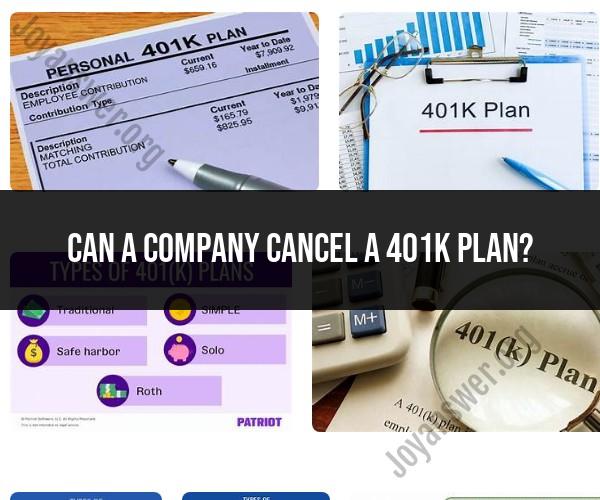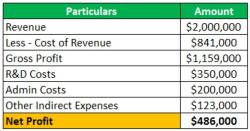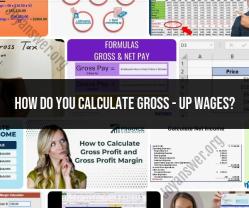Can a company cancel a 401k plan?
Yes, a company can choose to cancel or terminate a 401(k) plan, but there are specific steps and regulations that must be followed. Companies establish 401(k) plans voluntarily to provide retirement benefits to their employees, and they also have the discretion to terminate these plans if they wish to do so. Here are some key points to understand about the process:
Notification to Participants: When a company decides to terminate a 401(k) plan, it must notify plan participants and beneficiaries in writing. This notice typically includes the reasons for the plan termination and the effective date of the termination.
Vesting and Distribution of Funds: Any funds that you, as a plan participant, have contributed to the 401(k) plan are always yours and fully vested. However, employer contributions, including any matching contributions, may have a vesting schedule, which determines when you become fully entitled to those funds. When a plan is terminated, unvested employer contributions generally become fully vested.
Distribution Options: Upon plan termination, participants have several options for their vested account balances:
- You can choose to receive a distribution of the funds, which may be subject to income taxes and possibly early withdrawal penalties if you are not yet eligible for penalty-free withdrawals.
- You can roll over the funds into an Individual Retirement Account (IRA) or another employer's retirement plan if eligible, which can potentially defer taxes.
- Some plans may allow you to leave the funds in the plan if the account balance is above a certain threshold.
PBGC Coverage: The Pension Benefit Guaranty Corporation (PBGC) is a government agency that provides limited insurance for defined benefit pension plans. It does not cover 401(k) plans. Therefore, if your company terminates a 401(k) plan, the PBGC does not come into play.
Participant Protections: The Employee Retirement Income Security Act (ERISA) includes rules and protections for participants in employer-sponsored retirement plans, including 401(k) plans. These rules govern the termination process and ensure that participants have rights and options when a plan is terminated.
Timing and Transition: The termination process can take some time to complete, during which the plan administrator will work on the distribution of assets and compliance with regulatory requirements.
It's important to stay informed and communicate with your company's HR department or plan administrator if you are a participant in a 401(k) plan that is being terminated. Understanding your rights and options is crucial, as this will impact your retirement savings strategy. You may also want to consult with a financial advisor or tax professional to make informed decisions regarding the disposition of your 401(k) assets in the event of a plan termination.
Understanding the Process: Can a Company Terminate a 401k Plan?
Yes, a company can terminate a 401(k) plan. However, there are certain steps that the company must follow in order to do so.
First, the company must amend the plan document to include a termination provision. This provision must outline the process for terminating the plan and the rights and obligations of participants and beneficiaries.
Second, the company must provide notice to all plan participants and beneficiaries of the plan termination. This notice must be sent at least 60 days prior to the plan termination date.
Third, the company must distribute all plan assets to participants and beneficiaries as soon as administratively feasible after the plan termination date.
Legal Considerations When a Company Wants to Cancel a 401k Plan
There are a number of legal considerations that a company must take into account when terminating a 401(k) plan. These considerations include:
- ERISA compliance: The company must ensure that the plan termination is in compliance with the Employee Retirement Income Security Act of 1974 (ERISA). ERISA is a federal law that sets minimum standards for most voluntarily established pension and health plans in private industry to provide protection for individuals in these plans.
- State law compliance: The company must also ensure that the plan termination is in compliance with all applicable state laws.
- Plan document requirements: The company must follow the plan document requirements for terminating the plan.
- Participant and beneficiary rights: The company must respect the rights of participants and beneficiaries under the plan.
Employee Rights and Protections in the Event of 401k Plan Termination
Employees have a number of rights and protections in the event of a 401(k) plan termination. These rights and protections include:
- Notice of plan termination: Employees must be given at least 60 days' notice of the plan termination.
- Vesting of benefits: Employees must be vested in all of their plan benefits as of the plan termination date. This means that they have the right to receive all of their plan benefits, even if they leave the company before retirement.
- Distribution of plan assets: Employees have the right to choose how their plan assets are distributed to them. They can choose to receive a lump-sum distribution, roll over their plan assets to another qualified retirement plan, or purchase an annuity.
Employees can also file a complaint with the Department of Labor (DOL) if they believe that their rights have been violated in connection with a 401(k) plan termination.
If you are an employee and your company is terminating its 401(k) plan, it is important to understand your rights and options. You should contact your plan administrator or a financial advisor to get help making decisions about your plan assets.












